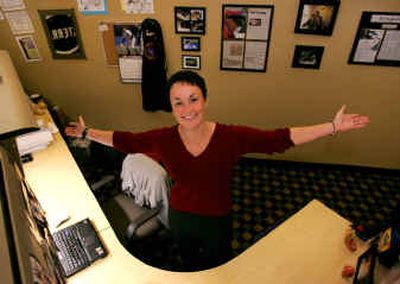Dashed dreams

The day she graduated from Northeastern University, Liz Erk thought she had it made.
The Boston public relations firm where she interned during her senior year promoted Erk to a full-time employee. It was 1999, the economy was booming, and Erk’s higher-ups told her she’d be a vice president in a few years.
But the past five years haven’t brought slick suits or a corner office.
By 2001, Erk found herself unemployed and struggling to make her rent, pay her utilities and feed her cats.
“It was a huge confidence breaker,” she said. “I was always very successful. … I thought yeah, the economy is bad, but I’m one of the best.”
Many members of the class of 1999 found their high hopes for the future similarly dashed. Although they were in demand and getting high salaries upon graduation, when the economy started slumping in mid-2000, they found themselves facing layoffs and pay cuts.
Five years later, many are struggling to move up the corporate ladder or out from under their parents’ wings — getting promoted or buying a house is harder than many anticipated.
College graduates were uniquely affected by the dot-com bust and the recession, partly because their expectations were warped by the booming 1990s, according to Jordan Goodman, author of “Everyone’s Money Book.” Many graduates flocked to the technology sector, which had been paying top dollar for the young and computer-savvy.
“Things were being handed to them right out of college, in a way no generation had ever seen,” Goodman said. “They anticipated the boom, which was clearly a bubble, to go on forever.”
Many soon found themselves on a downward slide.
Erk avoided a layoff at her PR firm in 2000, but only by leaving to work for a trade show hardware and software provider. After three months, she was laid off there.
She got personal training gigs at fitness clubs around the Boston area, but the cash wasn’t enough. She ran up over $20,000 in credit card to debt to pay for groceries and gas. In February 2001, she couldn’t afford to heat her home.
“I went from 22 with lofty visions of becoming a VP in a few years to wearing shorts to work every day … and huddling under a blanket with my cats for warmth,” Erk said. “Some VP.”
Nathan Kelley, who graduated DePaul University in 1999, went to graduate school for a year. He then saw money being made in high-tech and joined a software startup in Chicago. When the company was bought by Accutel Inc. after six months, Kelley and five friends started up another software company — just as the tech bubble was bursting. His company soon shut down.
“At that point, the bottomless pit of money had dried up,” Kelley said. “When we went back to the well, it was dry.”
Kelley had no income, no health insurance and no way to pay living expenses — it was time to move in with his grandmother in Cleveland.
For a humbling six months, Kelley searched for a job in consulting. When he finally found one and moved out, he cut corners wherever possible.
“On any day, I could tell you the beer specials anywhere in the city,” Kelley joked, adding, “I became a nicer person — that sense of invincibility disappeared.”
To survive the workplace now, many young people have had to start over on the bottom rung — not exactly the position many expected to be in five years after graduation.
According to Alexandra Levit, a Northwestern University graduate who recently wrote the book “They Don’t Teach Corporate in College,” her age group has aspirations that are “way out of whack with reality.”
“They’re very innovative, very entrepreneurial. … There’s a bit of a clash with managers, who are much more bureaucratic,” she said.
Kelley admitted that the last few years have been sobering. He now works at the Hospital Association in Cleveland, and is planning to make a down payment on a house soon.
“It’d be nice to be sitting on a pile of cash right now,” Kelley said. “But that’ll happen eventually.”
Michael McCullough, a 1999 graduate of Appalachian State University, is also in the process of buying a house, but only after living with his parents for the past five years to survive pay cuts. It’s a strategy Goodman said is common among today’s young people.
“There was no money to support living on my own,” McCullough said. “I lived meagerly — didn’t take on anything, didn’t have credit cards.”
Home ownership remains out the question for many twentysomethings, though, especially those that live in big cities. Goodman noted that while mortgage rates are on the decline, down payments are often unmanageable for young people who haven’t been working long enough to save.
Those issues have forced many to grow up fast.
Erk now works at Pan Communications, a public relations firm in Boston. She recently started a 401(k), but she estimates it will take about four more years to pay off her debt. She’s learned to keep a tight budget.
“I’m like a 40-year-old trapped in a 27-year-old’s body.”